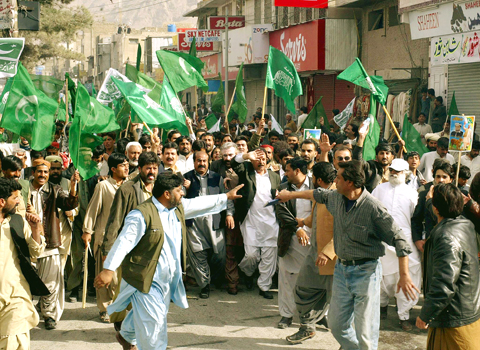Paramilitary troops were deployed in eastern Pakistan yesterday after supporters of former Pakistani prime minister Nawaz Sharif torched cars and stoned buildings to protest a court order that barred him from elected office.
The unrest and brewing political crisis risk distracting Pakistan’s shaky government from the fight against al-Qaeda and the Taliban and the country’s perilous economic situation.
Wednesday’s rulings upheld an existing ban on Sharif from contesting elections because of a criminal conviction related to the 1999 military coup by former president Pervez Musharraf that ousted Sharif as prime minister.

PHOTO: EPA
The rulings also removed his brother as head of the government in Punjab, Pakistan’s richest and most populous province.
Thousands of his supporters took to the streets on Thursday in several towns and cities, waving his party’s green flags and chanting anti-government slogans. Most were peaceful, but some set up barricades of burning tires and used rocks to smash the windows of stores and banks in Rawalpindi. Later, police and protesters clashed close to the capital and four vehicles were set alight.
Interior Ministry spokesman Shahedullah Baig said paramilitary troops were deployed in the Punjab Province on request of the provincial government. He provided no further details.
The court decisions prevent Sharif from challenging President Asif Ali Zardari in the 2013 general elections. Zardari compounded the blow by dismissing the government in Punjab and putting its governor — a Zardari loyalist — in charge.
Sharif, considered the country’s most popular politician, has accused Zardari of orchestrating the court decisions and called for protests.
He also has urged his supporters to join mass rallies planned for the middle of next month by Pakistan’s lawyers, whose protests for an independent judiciary undermined Musharraf’s long rule.
Dozens of judges who were ousted when Musharraf imposed emergency rule in 2007 have returned to the courts under the year-old government led by Zardari’s party.
But the government has blocked the return of Iftikhar Mohammed Chaudhry, the former chief justice who questioned a pact that quashed long-standing corruption charges against Zardari and his slain wife, former leader Benazir Bhutto.
Meanwhile, gunmen opened fire on a school van near the northwestern town of Hangu yesterday, killing its driver and injuring three students before abducting six other children, police officer Arshad Khan said.

Kehinde Sanni spends his days smoothing out dents and repainting scratched bumpers in a modest autobody shop in Lagos. He has never left Nigeria, yet he speaks glowingly of Burkina Faso military leader Ibrahim Traore. “Nigeria needs someone like Ibrahim Traore of Burkina Faso. He is doing well for his country,” Sanni said. His admiration is shaped by a steady stream of viral videos, memes and social media posts — many misleading or outright false — portraying Traore as a fearless reformer who defied Western powers and reclaimed his country’s dignity. The Burkinabe strongman swept into power following a coup in September 2022

‘FRAGMENTING’: British politics have for a long time been dominated by the Labor Party and the Tories, but polls suggest that Reform now poses a significant challenge Hard-right upstarts Reform UK snatched a parliamentary seat from British Prime Minister Keir Starmer’s Labor Party yesterday in local elections that dealt a blow to the UK’s two establishment parties. Reform, led by anti-immigrant firebrand Nigel Farage, won the by-election in Runcorn and Helsby in northwest England by just six votes, as it picked up gains in other localities, including one mayoralty. The group’s strong showing continues momentum it built up at last year’s general election and appears to confirm a trend that the UK is entering an era of multi-party politics. “For the movement, for the party it’s a very, very big

ENTERTAINMENT: Rio officials have a history of organizing massive concerts on Copacabana Beach, with Madonna’s show drawing about 1.6 million fans last year Lady Gaga on Saturday night gave a free concert in front of 2 million fans who poured onto Copacabana Beach in Rio de Janeiro for the biggest show of her career. “Tonight, we’re making history... Thank you for making history with me,” Lady Gaga told a screaming crowd. The Mother Monster, as she is known, started the show at about 10:10pm local time with her 2011 song Bloody Mary. Cries of joy rose from the tightly packed fans who sang and danced shoulder-to-shoulder on the vast stretch of sand. Concert organizers said 2.1 million people attended the show. Lady Gaga

SUPPORT: The Australian prime minister promised to back Kyiv against Russia’s invasion, saying: ‘That’s my government’s position. It was yesterday. It still is’ Left-leaning Australian Prime Minister Anthony Albanese yesterday basked in his landslide election win, promising a “disciplined, orderly” government to confront cost-of-living pain and tariff turmoil. People clapped as the 62-year-old and his fiancee, Jodie Haydon, who visited his old inner Sydney haunt, Cafe Italia, surrounded by a crowd of jostling photographers and journalists. Albanese’s Labor Party is on course to win at least 83 seats in the 150-member parliament, partial results showed. Opposition leader Peter Dutton’s conservative Liberal-National coalition had just 38 seats, and other parties 12. Another 17 seats were still in doubt. “We will be a disciplined, orderly